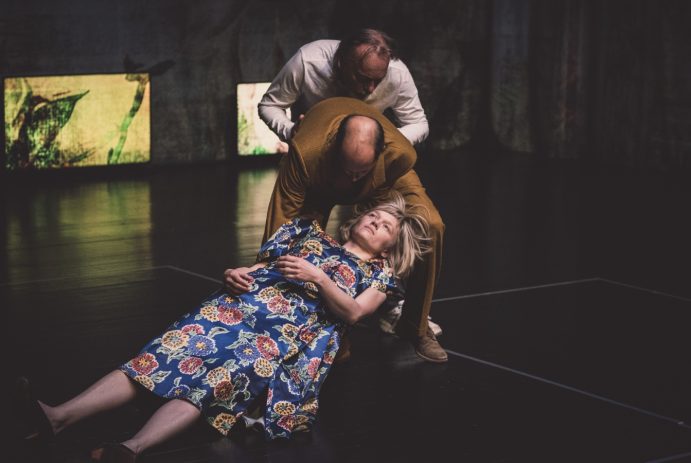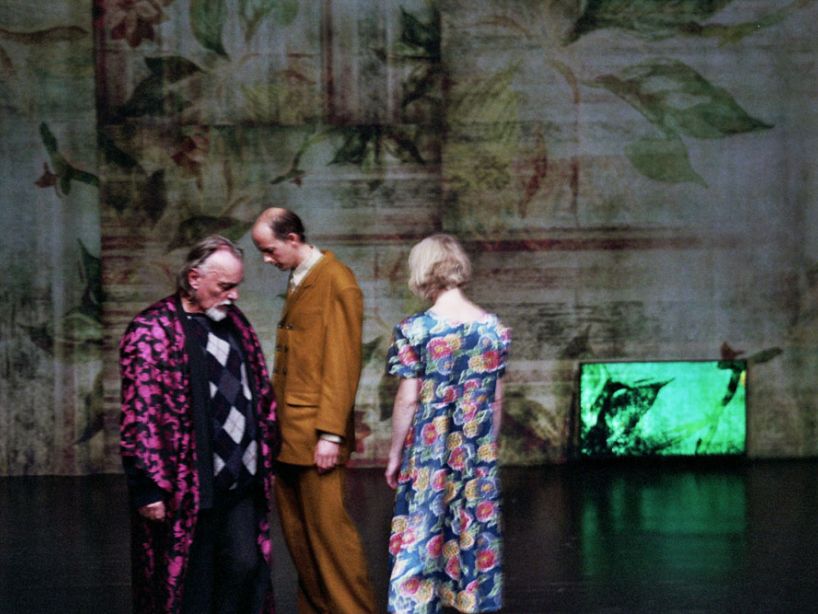Kroniek oder wie man einen Toten im Apartment nebenan für 28 Monate vergisst [Chronicle, or how a dead man is forgotten in the apartment next door for 28 months]
Director: Florian Fischer
NT Gent at Volkstheater’s Radikal Jung Festival (Munich)
Florian Fischer’s production explores (as the title suggests) the case of 53-year-old Michel Christen, a Swiss man who died in his Geneva apartment in 2003 and wasn’t found for twenty-eight months. Christen, a cancer patient, had a daughter, an ex-wife and was fairly well known among his neighbours, but whose death and absence went unnoticed. When the police finally went into the apartment in 2005 they only found a skeleton, the rest of the corpse had decayed and rotted away.
The production has two central focuses: first, what happens to a body as it decays —following the Buddhist belief in the temporary nature of the physical world and the eighteenth century Japanese watercolour illustrations Kusozu: the death of a noble lady and the decay of her body—and second, the question of how can someone simply disappear and be forgotten? Following the Kusozu illustrations, the three actors break down the stages of decay and the philosophy of decay, as well as reforming and re-remembering Christen (reversing decay and forgetting).

Maarten van Otterdijk’s stage is small and simple. Two televisions at the back of the stage, a houseplant (which, like a small tub, two large flags, and a white sheet and body bag, is moved on and off the stage throughout the performance), and large Japanese or Asian inspired fabrics as the curtains containing the stage on three sides decorate the stage.
The production is both a beautiful examination of a man who just disappeared from the world for twenty-eight months without a single person, including his family, noticing, simultaneously gesturing to the spectators’ and actors’ own mortality. Fischer and his three actors imbue the production with a quiet, respectful quality, asking how do we remember a man who was so easily forgotten? The production is built on a series of interviews trying to find the man who slowly melted away.
The spectator is invited to both contemplate their own morality, while also becoming part of the memorializing process for Christen. The production employs a mixture of text, movement, audience interaction and improvisation to contemplate death and the loneliness that accompanies death. A small stage with three actors and a close relationship with the audience throughout the performance serves to highlight that we are united in this loneness.

The production plays with what I can only assume is a universal fear of being forgotten. While death and mortality are certainly frightening enough alone, the concept of being forgotten, or worse not being noticed or acknowledged in death, is both terrifying and heart wrenching. Doesn’t everyone deserve to be remembered? How can a person, who was friendly and by all accounts enthusiastic and full of life, not be remembered or missed? Kroniek is a beautiful memorial to Christen, which carefully forms a collage of the life of a man who just disappeared only to reemerge as bones. It certainly hits slightly too close to home for those of us who live alone and whose rent and other bills are automatically transferred into the proper accounts.

Perhaps the most memorable and disturbing part of the evening was the fans handed out for the spectators to pass around. Fischer and his production team had a special perfume that replicated the smell of the apartment where Christen lived and died. Actually two separate smells: first, the apartment itself—the smell of the floor boards and the lavender floor polish, of old wood furniture and musty curtains—but the second smell was the smell of a man who had died, decayed and disappeared… the distinctive scent his neighbours must had smelled coming from his apartment and chose ignored.
When you are handed a fan and told the fan will smell like a corpse if you wave it you have two options: (1) Don’t wave it, or (2) Wave it. I, initially, thought when presented the opportunity to smell a corpse I would politely decline, in all honestly because of the fear that I might have smelled it before and not realized it was, in fact, a corpse I had smelled. Many people… in fact most people in the audience did not wave the fan and thus chose not to fill the theatre with the smell of a corpse. I, however, learned something about myself. When presented with the opportunity to fan a corpse fan, sitting in a small theatre (between two people who not to wave the fan because they presumably did not want to smell corpses), holding the fan in my own two hands, there is only one course of action. This corpse smell is strangely sweet but extremely unpleasant and, like most unpleasant smells, lingers. That being said, by waving the fan I forced my neighbours(and potentially the entire audience) was forced to share the experience with me.
Check out Kroniek‘s accompanying Instagram: https://www.instagram.com/eendodeman/
